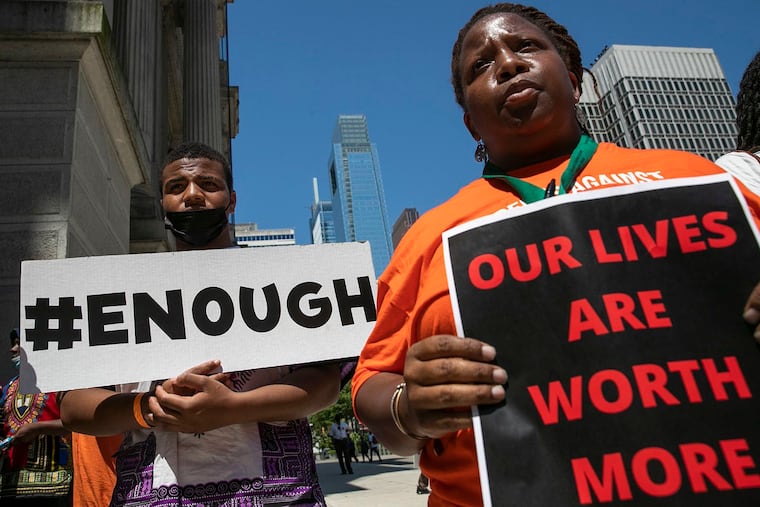When evaluating Philly’s anti-violence programs, ‘failure’ is in the eye of the beholder
For those with the greatest needs in our city — and the people who serve them — success can’t always be measured by statistics. It must be measured in lives.

The gun violence that has ravaged Black communities in Philadelphia is a reflection of America’s racism.
In order to deal with that uncomfortable truth, we must first grapple with the racial disparities that exist in every aspect of American life. It’s no accident that African Americans lag behind our white counterparts in educational attainment, employment rates, and household wealth. Centuries of racist policies have created those gaps, and in our poorest Black communities, the fight for resources and respect plays out in the form of gun violence.
For those who seek to address the resultant carnage, the struggle is difficult, the fight is long, and the solutions are anything but instant. That’s why my organization, ManUpPHL, chose to address gun violence by mentoring the very men and boys who are most likely to be victims or perpetrators.
Many of the men we serve have been traumatized by mass incarceration or the violent interactions they experience every day in a city where at least 500 homicides a year have become the norm. They live in communities where they must be wary of both their peers and the police. And because racism doesn’t often afford second chances to Black men, it’s hard for them to find living wage jobs after contact with the criminal justice system. For these men, and the people who serve them, success can’t always be measured by statistics. It must be measured in lives.
» READ MORE: It’s time to support the Black men in Philadelphia being destroyed by gun violence | Solomon Jones
I understood that truth when ManUpPHL received a $242,000 Community Expansion Grant from the city in 2021, but that didn’t stop us from setting lofty goals. We set out to serve 240 men through a mentoring program that pays participants $15 an hour. Through that program, which we call “Listening to the Streets,” ManUpPHL connects men with mental health services through our partners at New View Institute, jobs through our work with ShopRite and other employers, lessons on gun violence with trained facilitators, and other individualized resources.
We were careful with the CEG funding, working with our board of directors and our fiscal sponsor, the Urban Affairs Coalition, to account for every dime. As executive director, I chose not to accept a salary, and we hired consultants to handle community outreach, volunteer and program coordination, and marketing. Still, we fell short of our numerical goal, serving just 55 men during the 2022 grant year, largely because many of the men who went through our intake process did not show up to participate.
If the story ended there, one might assume that we’d failed. In fact, ManUpPHL was mentioned in a recent Inquirer story on anti-violence groups that received CEG grants. Specifically, the story highlighted the fact that ManUpPHL did not serve as many men as we intended. That’s true, but it doesn’t tell the whole story.
The men who did show up received our very best. We assisted them with mental health treatment, mentoring, stipends, and resources. We got jobs for men who society said were unemployable. We wrote letters of recommendation to foster second chances. We affected their ability to live productive lives.
It’s hard to run a nonprofit — especially when you’re dealing with an issue that has been hundreds of years in the making.
However, we knew that wasn’t enough, so we requested an extension on the CEG grant. Thanks to that extension, we’ve now served a total of 81 adults. We’ve formed a partnership with the School District of Philadelphia, and we are currently working with 30 teens in three schools. Counselors and administrators have recommended us to other schools. Two more are set to come on board in September.
We did not fail to serve a certain number. We learned to help men and boys change their lives.
As shooting victims get younger, we are working with those who need us most. The CEG grant helped us to begin that work in schools, and we have won other funding to continue those efforts, including a grant from the Greenfield Foundation. And as we recognize that racism and injustice are underlying factors in the fight against gun violence, we have sought and received a grant for our social justice efforts from the Philadelphia Foundation at the recommendation of the Philadelphia Eagles.
It’s hard to run a nonprofit — especially when you’re dealing with an issue that has been hundreds of years in the making. In a country where contempt for Black life plays out in the choking death of a homeless man on the New York City subway, or the shooting death of an 8-year-old girl by police officers who get probation, or the murder of a Black teen by another child from his community, there are no instant solutions.
However, when communities come together with the funding and the flexibility to address our issues for ourselves, we can have impact beyond the numbers, by saving one life at a time.